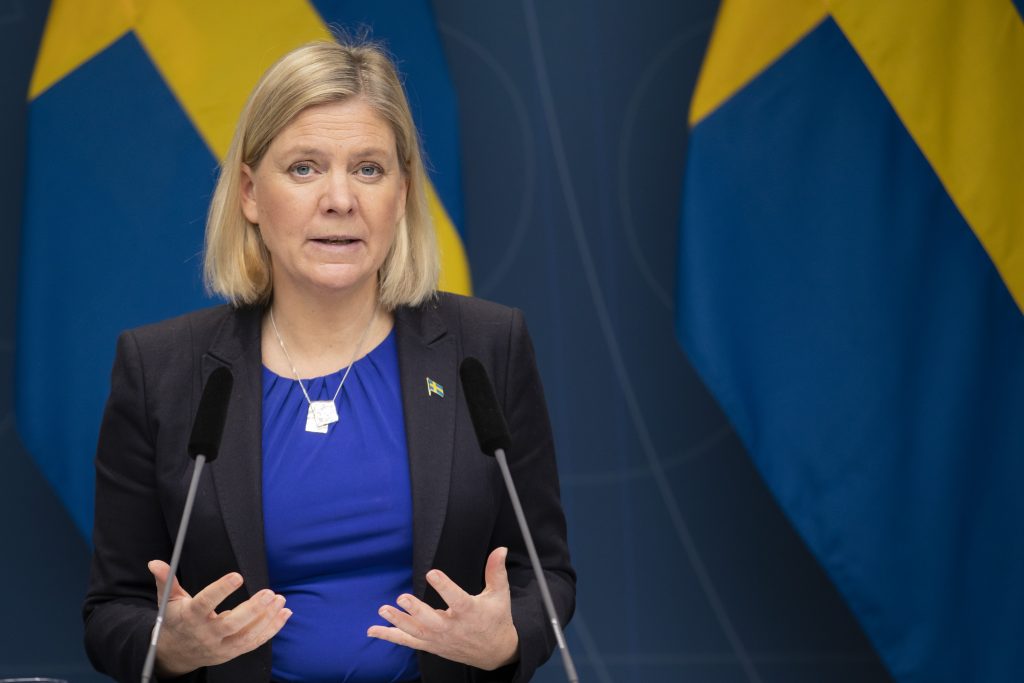Sweden is set to join Finland in applying to join NATO after the country's ruling Social Democratic party announced it would ditch its opposition to the military alliance.
Swedish Prime Minister Magdalena Andersson said that a formal application to join the bloc could be made in a matter of days.
Yet the ruling Social Democrats said in a statement that they would "declare unilateral reservations against the deployment of nuclear weapons and permanent bases on Swedish territory," if the application is approved by NATO.
A historic moment
For many years, Sweden's governing party has been against NATO membership; but Russia's invasion of Ukraine has awakened neighbouring countries to the need to bolster their defences against a bellicose and unpredictable Kremlin.
NATO Secretary-General Jen Stoltenberg said that the move was a "historic moment" and evidence that "aggression does not pay". The NATO chief added that their application would strengthen general security and was evidence that the alliance was open to new members.
Related News
- Finland officially confirms intention to join NATO
- Russia cuts off Finland's electricity exports ahead of NATO announcement
- Finland sets out NATO plans, Russia threatens retaliation
Yet in a move that could complicate their accession to the alliance, Turkey objected to Finland and Sweden's membership and has threatened to veto the move. However, NATO leaders played down the threat.
Time is of the essence
Germany's Foreign Minister Annalena Baerbock said at a dinner on Saturday that Germany and others would fast-track the application process for Finland and Sweden. "If these two countries are deciding to join, they can join very quickly," Baerbock said.
Denmark's Foreign Minister Jeppe Kofod dismissed the idea that threats from Russian President Vladimir Putin could hinder NATO from accepting new members.
"Each and every European country has a fundamental right to choose their own security arrangement," Kofod told reporters. "We see now a world where Putin and his ideology is the number one enemy of democracy."
Russia threatens retaliation
Finland's President Sauli Niinistö informed Vladimir Putin of Finland's membership bid in a phone call on Saturday. The Russian president said it would be a mistake to join.
Russia had previously threatened to deploy nuclear armament in the Baltic sea if Finland and Sweden join NATO. One of its justifications for the war in Ukraine was to hinder NATO from expanding, but Russian aggression in Ukraine has changed the security landscape of Europe.
Sweden's new calculations
The decision on Sunday by the board of the Social Democratic party was taken without much public discussion. Even the prime minister and the defence minister admitted that they had been hesitant and opposed NATO membership and only changed their minds in April after the Russian invasion of Ukraine.
The main argument for breaking with Sweden’s historical policy of neutrality and non-alignment was that “Sweden is best defended in the framework of NATO”, following years of Swedish disarmament and reduction of its armed forces after the end of the cold war.
Contrary to Finland, which has a 1,300 km long border with Russia and fought Russia twice during WII, the second time on Nazi-Germany’s side to recover lost territory, the last time Sweden was involved in a war against Russia was in the beginning of the 19th century. Its dubious neutrality policy was tested during WWII but kept Sweden out of the war.
After the war, Sweden has pursued a policy of non-alignment and advocated nuclear disarmament and peaceful solutions of conflicts. Being a member of NATO, under a nuclear umbrella and together with some authoritarian regimes, will make it difficult to continue this policy and claim that it is a “humanitarian power”.
Sweden claimed that it already had abolished its neutrality by joining the EU in 1995. The fact that Finland decided to join NATO and that Norway and Denmark already are NATO members changed the Swedish security calculations. A new argument was that Sweden can contribute to the common defence of Finland and other neighbouring countries if they would also would be threatened by Russia.
Russia’s invasion of Ukraine, under the pretext that it wanted to prevent NATO expansion, has had the opposite effect. It mobilised NATO to send weapons to Ukraine’s defence and prompted Sweden and Finland to apply for NATO membership fearing Russia’s intentions. In the meantime, the war rages on with no end in sight as direct peace talks and mediation attempts have been suspended.

